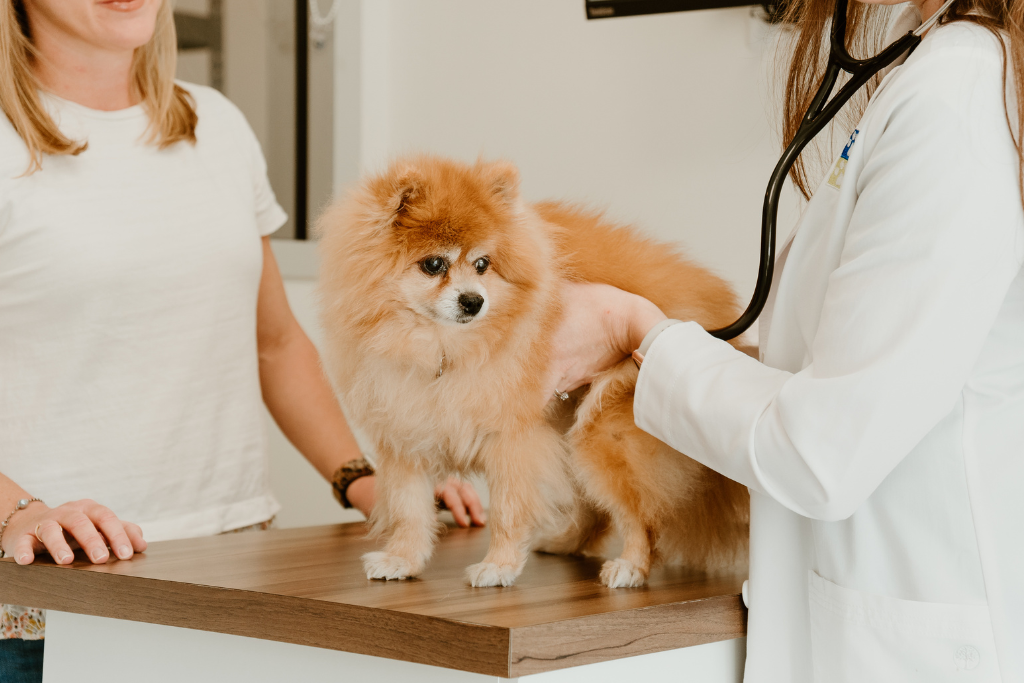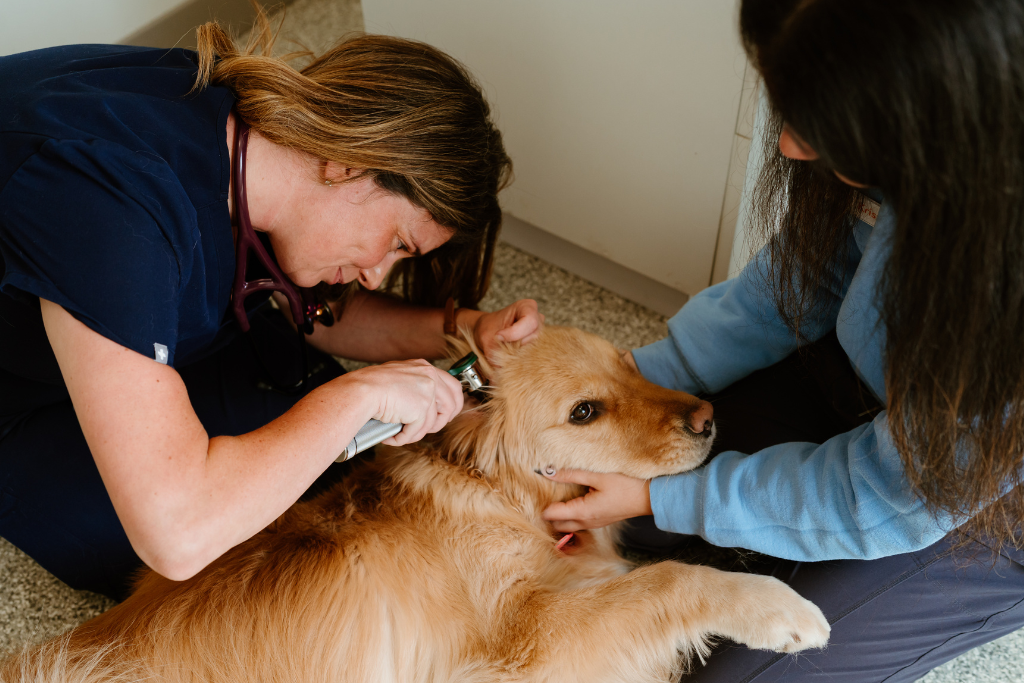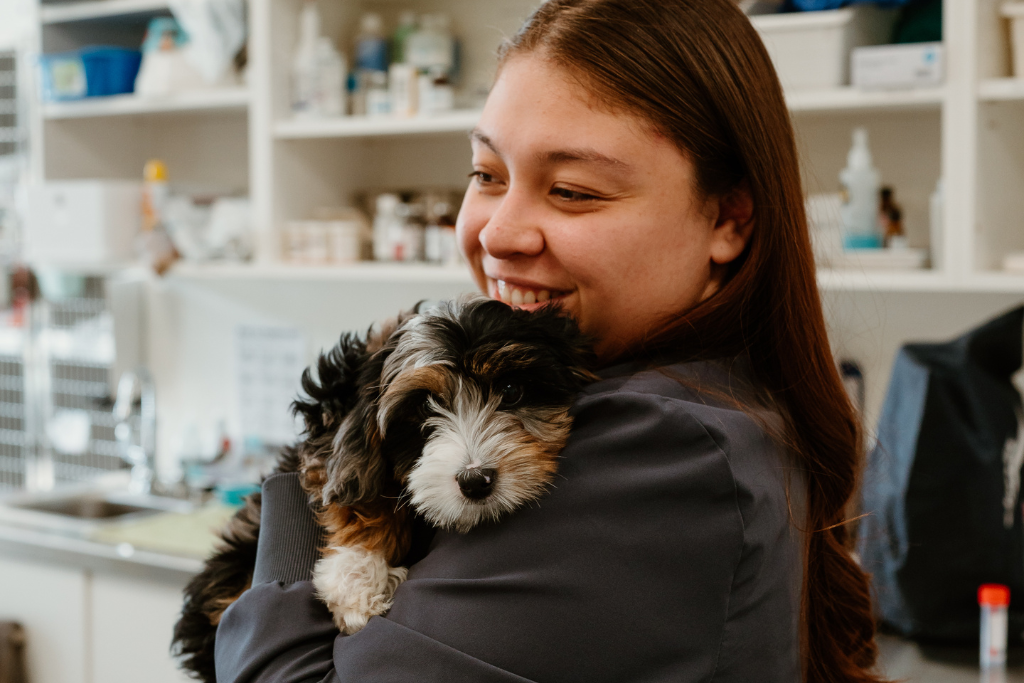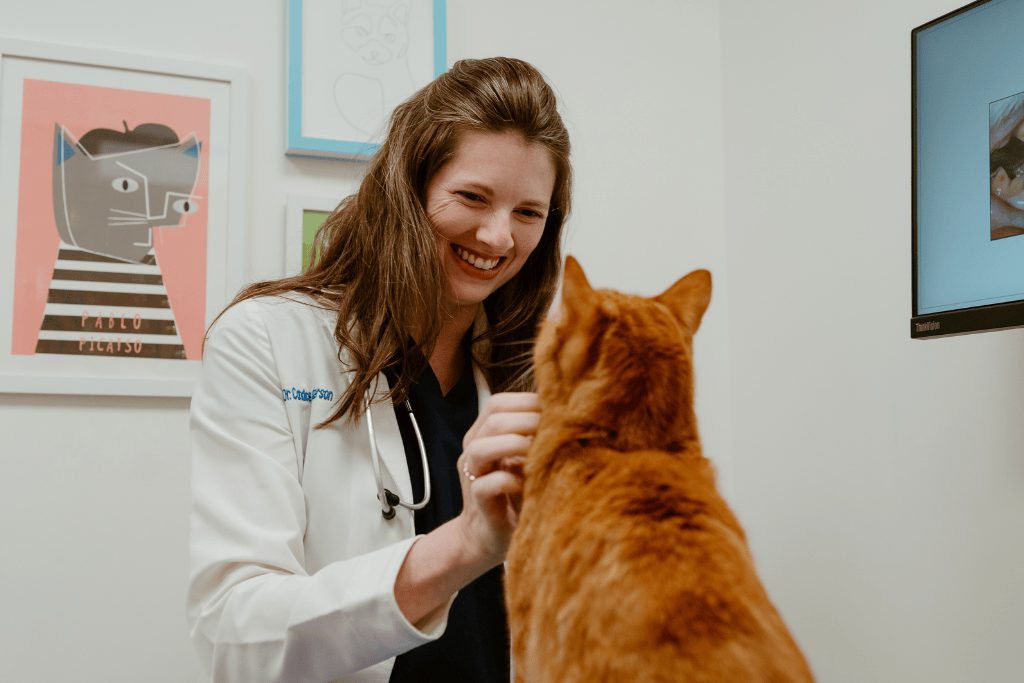Latest News

.png)
Choosing the Right Pet Food: A Vet-Approved Guide for Dogs & Cats
Proper nutrition is a key aspect of pet health. A good, well balanced diet in young dogs and cats can set them up for a long healthy life. With all the brands of pet foods on the market, choosing a nutritious pet food that you can trust can be a daunting task. There are a few important things to keep in mind while shopping for pet food that can help guide you in making the right choice for your pet.

Arthritis Awareness: What Every Pet Owner Should Know About Joint Health
Arthritis is one of the most common chronic conditions affecting pets, especially as they get older. This disease causes inflammation, pain, and stiffness in the joints, impacting mobility and overall quality of life. While often associated with senior pets, arthritis can occur in younger animals due to injury, genetic predisposition, or joint abnormalities. Arthritis affects an estimated one in five adult dogs, making it a leading cause of chronic pain.

Why Routine Exams and Bloodwork Are Essential for Your Pet’s Health
At 4 Paws, we cannot stress enough the importance of routine exams and bloodwork for cats and dogs. Annual exam and bloodwork is recommended for most pets 7 years and under. For cats and dogs over 7 years old or with chronic health conditions, it is strongly recommended to have your pet seen and bloodwork checked every 6 months at a minimum. Biannual bloodwork is especially important for senior pets, as aging animals are more prone to developing chronic illnesses.

Why Puppies And Kittens Need So Many Vet Visits
When you bring home a new puppy or kitten, vaccinations are one of the most important parts of keeping them healthy. But many pet owners wonder—why do these young animals need multiple rounds of the same vaccine, also known as boosters?The answer lies in how their immune systems develop. Puppies and kittens are born with some protection from their mother’s antibodies, which help them fight off disease early on.

Why Microchip Your Pet?
At 4 Paws, we strongly recommend that every pet have a microchip to help increase the chances of them being reunited should they ever get separated from you. A microchip is a tiny device, about the size of a grain of rice, that’s implanted under your pet’s skin—usually between the shoulder blades. It contains a unique ID number, which can be read by a scanner at most vet clinics, shelters, and animal control facilities. When your contact information is registered in a national pet recovery database, it’s easy for someone to notify you if your pet is found.
.png)
Intestinal Parasites in Pets
Intestinal parasites can be spread to dogs and cats through contact with an infected animal or from ingestion or physical contact with contaminated stool or soil. Parasite prevention is a vital aspect of maintaining the overall health and well-being of both dogs and cats and each month that a pet gets their oral or topical heartworm preventative, they are being dewormed against any intestinal parasites they have come into contact with in the previous month.

Importance of Heartworm and Flea Prevention
Heartworm and flea prevention are crucial aspects of maintaining the health and well-being of both dogs and cats. Heartworm disease, caused by parasitic worms transmitted through mosquito bites, can lead to severe lung disease, heart failure, and even death if left untreated. Treatment of heartworm infection in dogs is very costly and some dogs do not survive it. There are no good treatment options for cats with heartworm infection.
.jpg)
Just Say No to Awake Dentals
As pet owners, we all want what’s best for our fur babies, especially when it comes to their health. Dental care is an essential part of a pet’s overall health, yet many pet parents are enticed by the idea of anesthesia-free dental cleanings. Marketed as a safer, less expensive alternative to traditional veterinary dentistry, these procedures claim to clean your pet’s teeth while they area wake. At first glance, anesthesia-free dentals (also known as “awake dentals” or “non-anesthetic dentals”) may seem like a good idea—after all, anesthesia can feel scary (see our blog “Addressing Hesitancy Around Anesthesia”). However, these procedures do not provide real dental care and can actually do more harm than good.

Holiday Hazards for Pets: Keeping Your Furry Friends Safe
The holiday season is a time of joy, celebration, and festivity, but it also brings unique challenges for pet owners. From twinkling lights to delectable treats, the season's splendor can pose unexpected risks to our furry companions. To ensure your pets remain safe and happy throughout the holidays, it’s crucial to be aware of potential hazards and take preventive measures.

5 Safe Treats to Give Your Dog and 5 Foods to Never Give Your Dog
Choosing the right treats and avoiding harmful foods can significantly impact your dog's health and happiness. Carrots, apples, green beans, peanut butter, and blueberries are all excellent choices that offer nutritional benefits and can be used as rewards or snacks. On the other hand, chocolate, grapes, onions, avocados, and products containing xylitol should be kept far from your dog's diet to avoid serious health issues.

The importance of vaccinations for your pet
One crucial aspect of being a responsible pet parent is ensuring that your fur baby is up to date on all of its vaccinations. A lapse in vaccines can lead to serious illness, expensive hospital bills, death or even legal consequence in some cases. There are several different vaccines available for dogs and cats; some are required by law, some can prevent highly contagious diseases that all pets will be exposed to at some point in life andsome are considered “lifestyle” vaccines. Most of the illnesses that we vaccinate for have NO cure and can only be treated with supportive care. Determining which vaccines are important for your pet can be overwhelming so hopefully this helps break down the vaccines we provide at 4 Paws and why we feel they are important.
.jpg)
Solensia: A Breakthrough in Alleviating Cat Arthritis Pain
Cats, beloved companions known for their agility and grace, can suffersilently from arthritis as they age. This debilitating condition affects their joints, causing pain and stiffness, which can significantly impact their quality of life. Arthritis pain in cats is under diagnosed in veterinary medicine since cats hide their pain well and signs of pain in cats can be very subtle and easily overlooked. While there are various treatments available, Solensia has emerged as a promising new option for managing arthritis pain in cats.
.jpg)
Understanding Librela Injections for Dogs: A Comprehensive Guide
Arthritis pain can often be an overlooked health conditionin dogs. Most people think that if their dog is not actively limping oryelping, they are not in pain but this is actually not true. Signs of arthritis pain in dogs include slowness to lay down or stand up, gait changes such as swaying hips while walking, panting, decreased appetite, not wanting to go forlong walks anymore, and the list goes on. Even younger dogs can develop arthritis pain for various reasons. In the past, we have had to manage this pain with oral medications that can have effects on the liver, kidneys and stomach after long term use. Thankfully, we now have a new option for arthritis pain management in dogs with an injection called Librela.

Protecting Your Furry Friends: The Crucial Role of Heartworm Prevention in Dogs and Cats
As pet owners, our top priority is the health and happiness of your beloved furry companions. However, amidst the joys of pet ownership, there are hidden dangers that require our attention, one of which is heartworm disease. This silent threat can affect both dogs and cats, potentially leading to severe health complications and even death. In this blog, we'll explore the importance of heartworm prevention and why it's crucial for the well-being of our cherished pets.

Proper Cat Etiquette and Setting your Kitties Up for Success
There seems to be a never-ending plethora of information regarding cats and proper care, and it can become very overwhelming to sift through it all. How many litter boxes are recommended, and what type of litter? Where should their food bowls be in relation to their litter boxes? What about in multiple cat households? Cat owners want to be able to take an active role in their cats’ home health and be able to have a single source where all this information can be found. This post is meant to help with this task and provide insight for helping your cats put their best paw forward. If you have additional questions that are not answered here, please reach out to us at 4Paws Animal Clinic

Feline Lower Urinary Tract Disease and Feline Idiopathic Cystitis
What is the number one reason cats go to the vet? The answer may surprise you- it is not due to GI issues or eating something they shouldn’t, but actually due to inappropriate urination. Many clients end up at 4Paws asking our veterinarians why their cats are not using the litterbox properly. There can be several reasons why, and one very common reason is feline lower urinary tract disease, a disorder that affects a cat’s urinary tract and urinary bladder, causing discomfort and an urge to urinate in places considered “inappropriate” due to inflammation in the urinary bladder. This can lead to severe disease if left untreated, and therefore any changes to your cat’s urinary behaviors should be investigated immediately.

Pet Insurance: The Best Gift You Will Ever Give Your Pet
One of the foremost reasons to consider pet insurance is the financial security it provides. Unexpected accidents or illnesses can lead to substantial veterinary bills, potentially placing a significant strain on your budget. Average emergency vet bills can range from $800-1500 but can quickly exceed $5000 for severe emergencies. Pet insurance acts as a safety net, ensuring that you can afford the best medical care for your pet without compromising on their health. This financial security allows pet owners to make decisions based on what's best for their pet rather than being constrained by financial concerns, fostering a healthier and happier relationship between pets and their owners.
.jpg)
New Kitten
The most important thing for you to do after you get a new kitten is to schedule an appointment with your veterinarian to establish care and do a thorough physical exam to be sure the kitten is in good health. It is equally important to get an accurate health record from the breeder or shelter so that we can see what vaccinations the kitten has already had and what they are due for next. Kittens typically start getting vaccines between 6-8 week sold and should continue to get them every 2-4 weeks until they are at least 16weeks old. At the first kitten visit, we will examine the kitten, update vaccines that are needed such as FVRCP. Depending on the age of the kitten, we may also recommend to vaccinate for Feline Leukemia as well (see our blog about vaccinations in dogs and cats).

New Puppy
The most important thing for you to do after you get a new puppy is to schedule an appointment with your veterinarian to establish care and do a thorough physical exam to be sure the puppy is in good health. It is equally important to get an accurate health record from the breeder or shelter so that we can see what vaccinations the puppy has already had and what they are due for next. Puppies typically start getting vaccines between 6-8 weeks old and should continue to get them every 2-4 weeks until they are at least 16weeks old. At the first puppy visit, we will examine the puppy, update vaccines that are needed such as Distemper/Parvo and Bordetella. Depending on the age of the puppy, there are other vaccines that we may recommend as well (see our blog about vaccinations in dogs and cats).

The Importance of Annual Bloodwork for Our Pets
Most pet owners come to expect and appreciate the importance of annual examinations, vaccinations and heartworm and flea prevention for their pet. Something that is equally important that will be recommended annually for every pet is bloodwork. Bloodwork panels can be as simple as a parasite screening or can be a more comprehensive check of all internal organ functions. Determining which bloodwork panel is right for your pet is something that will be discussed with you and your veterinary team at 4 Paws Animal Clinic at each annual visit.

Feline Urinary Issues and Tips for Prevention
Our feline friends make great companions and can provide so much joy to our lives. It is important to keep them just as healthy and happy as they make us. One medical concern cats are predisposed to developing is urinary issues, which can become a significant roadblock to both their and our quality of life. There are several ways to help mitigate this, and this post is meant to help cat owners navigate prevention of these disorders to keep our kitty friends happy and healthy. 4 Paws Animal Clinic in Winter Park is available to help take care of your cat's urinary issues.

Upper Respiratory Infections in Dogs
At some point in every dog’s life they will be exposed to some form of respiratory infection. It isbest to be prepared for this through vaccination and routine exams with a veterinarian.

The Importance of Annual Bloodwork for Our Pets
Why do we find bloodwork to be such an important aspect of preventative care at 4 Paws? The answer is simple: a pet may look healthy from the outside, but we could be missing crucial details about organ functions without looking at the body’s chemistry through bloodwork.

Help Your New Pet Live a Longer, Healthier Life with Spaying and Neutering
One subject that is of great importance, and that our veterinarians at 4Paws Animal Clinic take very seriously, is the recommendation to spay or neuter your pet.

Importance of Routine Dental Care
Dental disease is one of the most common health problems seen in dogs and cats.

Addressing Hesitancy Around Anesthesia
Our number one goal is always to provide responsible treatment for our patients so that they can return to the owner happy and healthy.

Importance of Annual Dental Cleanings in Pets
One aspect of pet health that is commonly overlooked is dental health.

Food Allergies in Dogs and Cats
A rarer form of allergies in dogs and cats, though equally problematic, are food allergies.

Environmental Allergies in Your Pets
The most common cause of allergic itch that we see in pets are environmental allergens.

Allergy/Atopica Treatment Options for Pets
Dogs and cats can suffer from allergies to various things such as fleas, food or environmental allergens.



